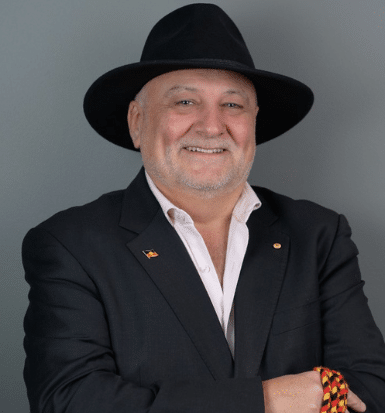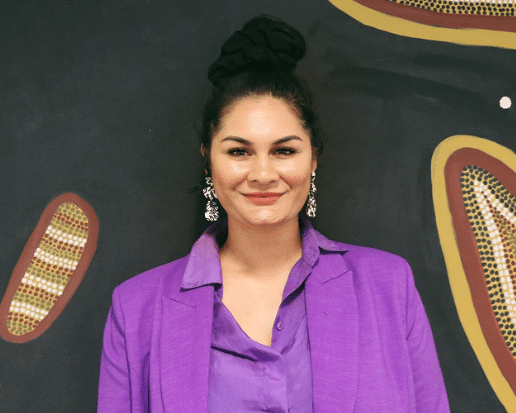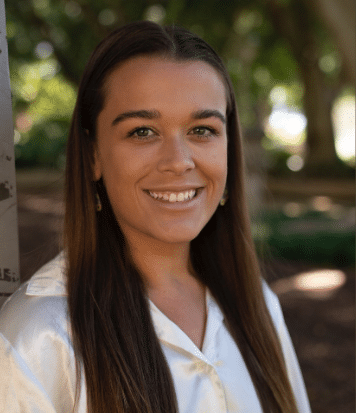Aboriginal and Torres Strait Islander leaders have preserved and shared ancient knowledge, laws, and traditions for tens of thousands of years. These leaders play a vital role not only within their communities but also in shaping broader conversations about leadership across Australia. As workplaces evolve, the unique qualities of First Nations leadership offer profound insights into more inclusive, sustainable leadership practices.
At a recent First Nations Insights event, DCA’s Dr Virginia Mapedzahama hosted an exploration of how First Nations leadership can be better understood, nurtured, and celebrated in the workplace, joined by:
- Professor Deen Sanders OAM, Partner, Deloitte Australia
- Jordin Payne, Principal Aboriginal Community Relationships, Water Corporation
- Abbey Wright, Learning and Development Coordinator, Australian Indigenous Governance Institute.
The discussion illuminated the unique qualities of First Nations leadership including the role of culture, land, and community in shaping leadership potential.
The unique qualities of First Nations leadership
First Nations leadership is deeply connected to knowledge, relationships, and responsibility. Unlike Western leadership models, which often focus on titles, hierarchy, and individual achievement, First Nations leadership emphasises a collective responsibility to culture, land, and community. It is anchored in humility, respect, and an understanding of the power that lies in the relationships between people and their environment.
As Professor Deen Sanders OAM shared, “Leadership in our culture is not about job titles or positions… it’s about knowledge, responsibility, and relationships.” Professor Sanders emphasised that First Nations leadership is centred around the health of the entire system, not individual status or accolades. This perspective encourages leaders to think beyond immediate outcomes and consider their responsibility to future generations – a notion known as the seven generations principle.

“It’s the idea that I’m responsible for how the decisions I make today will affect the next seven generations.
“When I think through my responsibility, it is not to me, or my employer, or the next quarter or my next KPI, it is to the next seven generations,” said Professor Sanders.
“And if we understand our responsibility as leaders in that context, it gives us permission to be truthful about things. It gives us permission to let go of the differences that conflict us, or challenge us, and lead to pain and suffering. It can move us onto a bigger conversation about that longer-term future.”
For Professor Sanders, leadership is a responsibility passed down through generations, one that prioritises collective wellbeing over individual success.
“The purpose of leadership in our culture is the health of the whole system. My job as a leader and as an elder of my community is to think about how I’m contributing to the health of the whole system. How am I contributing to everybody in the school, everybody I work with, everybody in this nation?” he said.
The role of culture, land, and community in leadership
For Jordin Payne, leadership is not an individual pursuit; it’s cultivated through the guidance of Elders and the teachings of Country and community. This connection to land and culture shapes leadership in profound ways.
“For First Nations people, you don’t walk into the boardroom with 35 years of experience, you walk in with 35+230 years of experience because we have all this knowledge that has been transferred to us,” Jordin said.
“The knowledge we hold is not just ours, there is a whole other generation that comes with that experience, and it teaches us how to be creative with the problems we must solve. My leadership journey has been about translating those learnings, bringing to the table the way we approach problems and problem-solving, and how we look at relationships and systems.”
This perspective encourages leaders to view their roles as temporary custodians of knowledge, resources and environments, with the responsibility of preserving and passing these things on to future generations.
“We don’t just think about the time we have on earth, we think about the time after us,” Jordin said.
“We are just passing through and that is the only irrevocable promise. And just as we pass through, knowledge passes through us and then we must pass that knowledge on.”

Nurturing leadership potential in First Nations people
Nurturing leadership potential in First Nations people involves creating environments where cultural knowledge is respected and valued. For many First Nations leaders, their leadership journey is influenced by the guidance of Elders and the opportunities created by previous generations. As Abbey Wright shared, “My leadership journey began with doors my parents, Elders, aunts, and uncles fought really hard to open for me.”

“When I think about my journey and what leadership has looked like to me, it has been shaped by the incredible First Nations leaders who have come into my life,” Abbey said, “I have been privileged to walk alongside them, learn from them, and grow with them and that is something that I will never take for granted and it is something that I hope to do for future young ones.”
To nurture this potential, workplaces must provide space for First Nations leaders to express their cultural identity and bring their perspectives to the table. This means valuing Indigenous knowledge systems and understanding that leadership can be expressed in many different ways – not just through formal titles or traditional Western frameworks.
“True leadership and governance must reflect the lived experiences, the values and the aspirations of the communities it serves,” Abbey said.
“I really do think that centring First Nations voices is crucial. It ensures individuals and communities play a direct role in shaping their futures.”
Celebrating First Nations leadership in the workplace
First Nations leadership offers powerful insights that can transform modern workplaces. Taking inspiration from and platforming First Nations leaders not only benefits Aboriginal and Torres Strait Islander employees but also enriches the entire organisation by fostering a culture of respect, collaboration, and long-term thinking.
As Professor Sanders reminded us, “Be respectful. Recognise that Indigenous knowledge is different, and it should be valued for that difference. Don’t have them change; think about the system changing to fit them.
“Entertain the possibility that our knowledge system, 100,000 years of science about relationships and systems, is probably pretty useful in contrast to a Western rationalist system that’s only a couple of hundred years old.”
By understanding, nurturing, and celebrating the unique qualities of First Nations leadership, we can create more inclusive, sustainable, and responsible organisations.
“Our leadership model is an embracing one, our country is an embracing one, our culture is an embracing one. Everybody can be part of this particular story,” Professor Sanders said.
DCA members can hear more from Professor Deen Sanders OAM, Jordin Payne and Abbey Wright by watching the recording of DCA’s First Nations Insights event The power of First Nations leadership.
Additional resources
- DCA’s Aboriginal and Torres Strait Islander Peoples resource page
- Respecting First Nations knowledge in business, Dr Terri Janke
- Why a connection to country is so important to Aboriginal communities, Catherine Liddle
- Indigenous Business Growth: Working Together to Realise Potential report, Supply Nation & First Australians Capital
- Understand the 10 truths to centre Indigenous Australians’ voices to create workplace inclusion, Jumbunna Institute
- Gari Yala (Speak the Truth): Centreing the experiences of Aboriginal and/or Torres Strait Islander Australians at work, Jumbunna Institute
- First Nations Cultural and Intellectual Property, DCA event
- First Nations Inclusion at Bunnings: from empathy to effective results, case study
